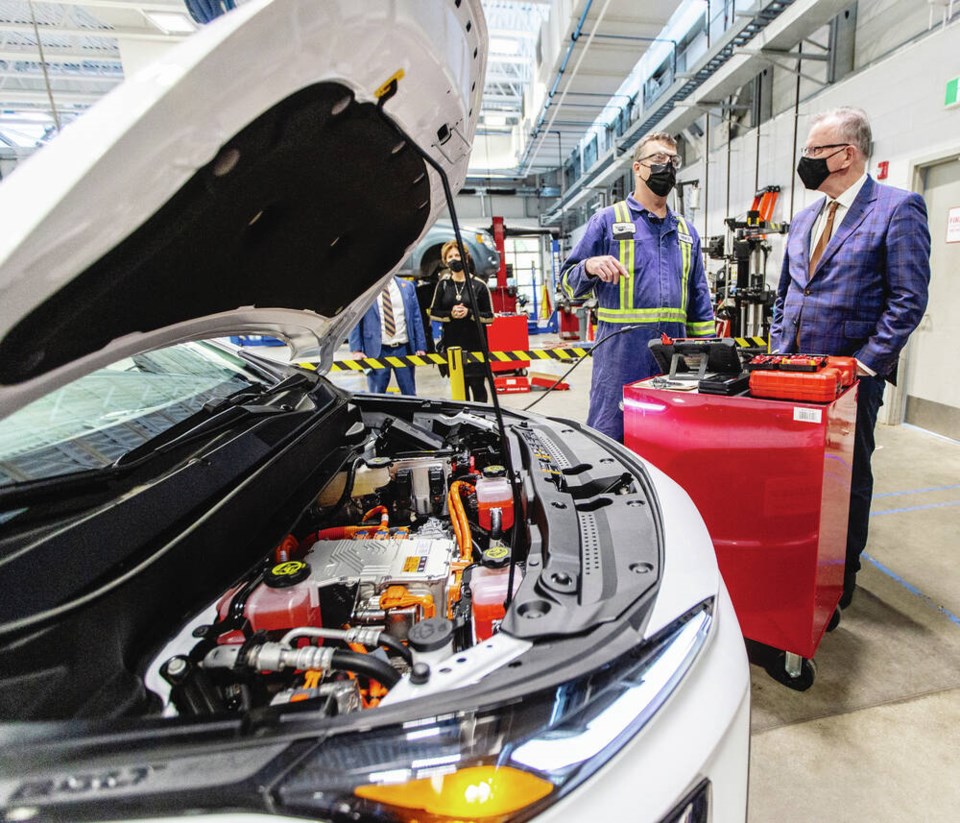Camosun College is now able to help automotive technicians keep up with the changing face of the auto industry.
With electric vehicle use on the rise and manufacturers investing heavily in electric technology, the province has kicked in $440,000 to expand an electric-vehicle maintenance training program, first launched at the B.C. Institute for Technology in 2020.
The additional funds allowed Camosun to offer two one-week, in-person courses at its Interurban campus for local technicians to upgrade their skills. It has the school considering as many as three more in 2022.
“There is great demand,” said Patrick Jones, automotive technician program leader at Camosun. “I have a long list of people wanting to take the course.”
The school has been fielding calls about a continuing education program, while interest in learning how to work on electric vehicles is coming from all corners – from Red Seal technicians, other tradespeople, backyard hobbyists and everyone in between.
Connall Argue, a Red Seal technician at Rand Automotive who did his apprenticeship training at Camosun and has come back to learn how to work on electric vehicles, said the program is a reflection of the reality on the street.
He recalls it was a novelty to see a Tesla electric vehicle cruise down the street a decade ago, while it’s run-of-the-mill these days.
“It was like seeing a Ferrari or Lamborghini, and now it’s a daily thing,” he said, noting the cars are everywhere and even taxis are using them. “I’m really looking forward to learning a lot more and bringing that knowledge to the field and sharing it with my peers and co-workers.”
That may be essential given the demand and the lack of spaces for training.
Jones said they hope to get three more courses – 24 students – through the program in 2022.
Eight students went through the program earlier this year and eight more are in the midst of it now.
The EV Maintenance Training program is offered regularly at BCIT but is only a pilot project at Camosun, while Okanagan College’s Kelowna campus and the College of New Caledonia’s Prince George campus also ran pilot projects this year.
Bruce Ralston, minister of Energy, Mines and Low Carbon Innovation, said the idea of the program expansion is to align skills with the low-carbon economy.
“With more than 60,000 electric vehicles on the road, British Columbia is leading the country in the transition to EVs,” he said. “We’re supporting this transition by helping auto technicians develop the skills they need to work on EVs throughout the province.”
The demand for skills to fix and modify electric vehicles is only going to grow.
The federal government has set a mandatory target for all new light-duty cars and passenger trucks to be zero-emission by 2035. The province has followed suit.
Ralston said by expanding maintenance training they are breaking down the barriers to buying electric vehicles – one of those being where to get them serviced.
“By developing our EV sector, we are creating good jobs and a growing industry that supports our Clean B.C. goals and our transition to a clean-energy future,” he said.
The Clean B.C. Roadmap to 2030, which lays out details of a transition to a net-zero future and reducing greenhouse gas emissions, includes requiring automakers to meet an escalating annual percentage of new light-duty zero-emission sales including 100 per cent of them by 2035.
Saanich-South MLA Lana Popham said the program will translate to more auto repair shops offering electric vehicle repair and help more people make the switch to electric.



